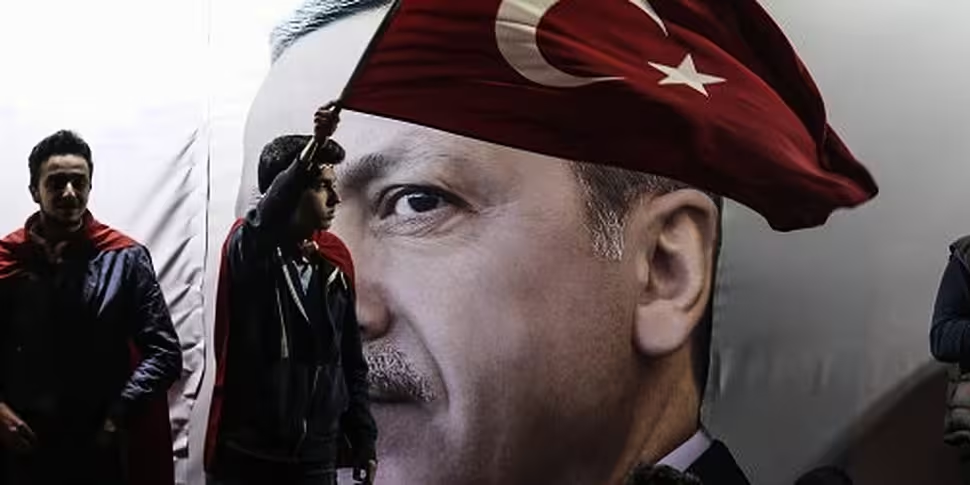A delegation of international observers has concluded that Sunday’s referendum in Turkey “fell short of international standards.”
The international observer mission has accused the country’s electoral board of removing important safeguards against fraud and warned that a last minute decision to accept unstamped ballots “contradicted the law that explicitly states that such ballots should be considered invalid."
The report from the ODIHR limited election observation mission found that the landmark referendum – which awarded sweeping new powers to the country’s president – was not fought on a level playing field, with fundamental freedoms curtailed.
Unlevel playing field in Turkey's constitutional referendum: preliminary conclusions by international observers https://t.co/VJ23jx5T1r
— OSCE (@OSCE) April 17, 2017
It found that freedom of expression was limited throughout the campaign – with government funds used to promote a ‘Yes’ vote.
“The referendum took place in a political environment in which fundamental freedoms essential to a genuinely democratic process were curtailed under the state of emergency, and the two sides did not have equal opportunities to make their case to the voters,” said Tana de Zulueta of the international referendum observation mission.
“Our monitoring showed the ‘Yes’ campaign dominated the media coverage and this, along with restrictions on the media, the arrests of journalists and the closure of media outlets, reduced voters’ access to a plurality of views."
Some of the reports main findings include:
- The referendum took place on an unlevel playing field and the two sides of the campaign did not have equal opportunities.
- Voters were not provided with impartial information about key aspects of the reformations in question.
- Civil society organizations were not able to participate.
- Fundamental freedoms essential to a genuinely democratic process were curtailed.
- The dismissal or detention of thousands of citizens negatively affected the political environment.
- One side’s dominance in the coverage and restrictions on the media reduced voters’ access to a plurality of views.
- While the technical aspects of the referendum were well administered and referendum day proceeded in an orderly manner, late changes in counting procedures removed an important safeguard and were contested by the opposition.
Presidential powers
The 18 constitutional amendments included in the referendum will change the role of president into a nearly all-powerful position as head of government, head of state and head of the ruling party.
The office of prime minister is set to be abolished - allowing the president to draft the budget, declare a state of emergency and issue decrees overseeing ministries without parliamentary approval.
Turkey’s main opposition party has vowed to contest the referendum result, insisting it would take its challenge to the European Court of Human Rights if necessary.
The deputy chairman of the People's Republican Party (CHP) said there had been complaints in many regions that people had been blocked from voting in private - and that some ballots had been counted in secret.
Bulent Tezcan told a news conference on Monday that the decision to allow unstamped ballots was clearly against the law.
"At the moment it is impossible to determine how many such votes there are and how many were stamped later,” he said. “This is why the only decision that will end debate about the legitimacy (of the vote) and ease the people's legal concerns is the annulment of this election by the [electoral board]," he said.
The CHP has insisted that it has already discovered some 2.5 million problematic votes and vowed to challenge 37% of the ballot boxes.
It claimed on its Twitter account that data "indicates a manipulation in the range of 3% to 4%."
EU observers
One member of a team of 20 impartial observers from the EU tweeted this morning that the election was “unfair and unfree.”
Stefan Schennach said the group was “deeply worried” about the circumstances of the vote – adding that police had blocked their observation on two occasions.
#PACE #Turkiye day5: we leave today #mardin - under this unfair and unfree circumstances 49 % is a big success for opposition and NGO's
— Stefan Schennach (@stefanschennach) April 17, 2017
While the final results of the referendum will be declared in 11-12 days, the electoral board has already confirmed victory for the ‘Yes’ side.
The state-run Anadolu Agency said the "yes" vote stood at 51.41%, while the "no" vote was 48.59%.
The winning margin fell short of the sweeping victory President Recep Tayyip Erdogan was hoping for – however it is expected to cement his hold on power and have a huge effect on the country’s future.
Following the victory announcement he warned opposition leaders not to “belittle” his narrow victory - warning that it is “too late now” to change the result.









